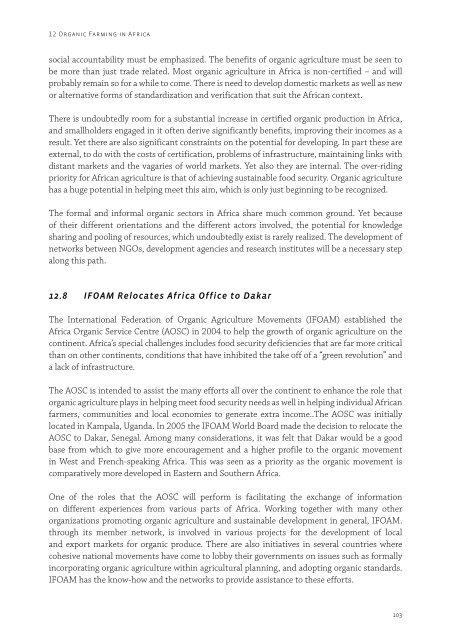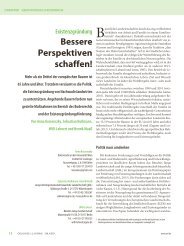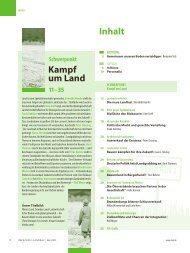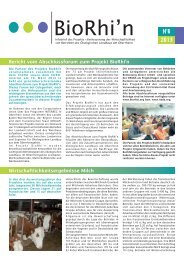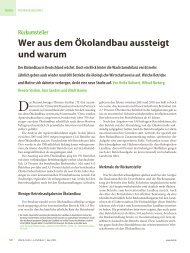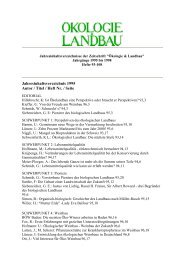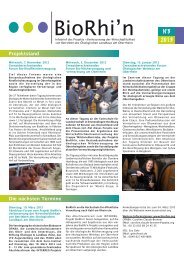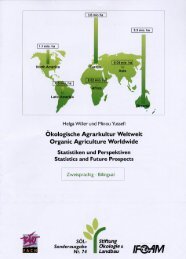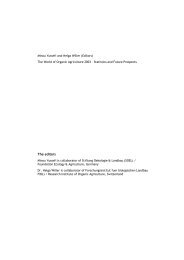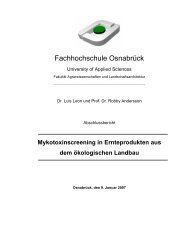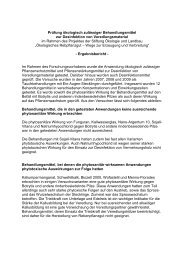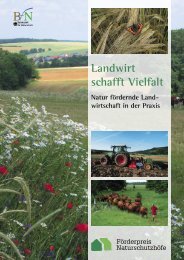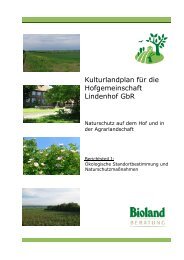the world of organic agriculture - Organic Eprints
the world of organic agriculture - Organic Eprints
the world of organic agriculture - Organic Eprints
Create successful ePaper yourself
Turn your PDF publications into a flip-book with our unique Google optimized e-Paper software.
12 <strong>Organic</strong> Farming in Africa<br />
social accountability must be emphasized. The benefits <strong>of</strong> <strong>organic</strong> <strong>agriculture</strong> must be seen to<br />
be more than just trade related. Most <strong>organic</strong> <strong>agriculture</strong> in Africa is non-certified – and will<br />
probably remain so for a while to come. There is need to develop domestic markets as well as new<br />
or alternative forms <strong>of</strong> standardization and verification that suit <strong>the</strong> African context.<br />
There is undoubtedly room for a substantial increase in certified <strong>organic</strong> production in Africa,<br />
and smallholders engaged in it <strong>of</strong>ten derive significantly benefits, improving <strong>the</strong>ir incomes as a<br />
result. Yet <strong>the</strong>re are also significant constraints on <strong>the</strong> potential for developing. In part <strong>the</strong>se are<br />
external, to do with <strong>the</strong> costs <strong>of</strong> certification, problems <strong>of</strong> infrastructure, maintaining links with<br />
distant markets and <strong>the</strong> vagaries <strong>of</strong> <strong>world</strong> markets. Yet also <strong>the</strong>y are internal. The over-riding<br />
priority for African <strong>agriculture</strong> is that <strong>of</strong> achieving sustainable food security. <strong>Organic</strong> <strong>agriculture</strong><br />
has a huge potential in helping meet this aim, which is only just beginning to be recognized.<br />
The formal and informal <strong>organic</strong> sectors in Africa share much common ground. Yet because<br />
<strong>of</strong> <strong>the</strong>ir different orientations and <strong>the</strong> different actors involved, <strong>the</strong> potential for knowledge<br />
sharing and pooling <strong>of</strong> resources, which undoubtedly exist is rarely realized. The development <strong>of</strong><br />
networks between NGOs, development agencies and research institutes will be a necessary step<br />
along this path.<br />
12.8 IFOAM Relocates Africa Office to Dakar<br />
The International Federation <strong>of</strong> <strong>Organic</strong> Agriculture Movements (IFOAM) established <strong>the</strong><br />
Africa <strong>Organic</strong> Service Centre (AOSC) in 2004 to help <strong>the</strong> growth <strong>of</strong> <strong>organic</strong> <strong>agriculture</strong> on <strong>the</strong><br />
continent. Africa’s special challenges includes food security deficiencies that are far more critical<br />
than on o<strong>the</strong>r continents, conditions that have inhibited <strong>the</strong> take <strong>of</strong>f <strong>of</strong> a “green revolution” and<br />
a lack <strong>of</strong> infrastructure.<br />
The AOSC is intended to assist <strong>the</strong> many efforts all over <strong>the</strong> continent to enhance <strong>the</strong> role that<br />
<strong>organic</strong> <strong>agriculture</strong> plays in helping meet food security needs as well in helping individual African<br />
farmers, communities and local economies to generate extra income..The AOSC was initially<br />
located in Kampala, Uganda. In 2005 <strong>the</strong> IFOAM World Board made <strong>the</strong> decision to relocate <strong>the</strong><br />
AOSC to Dakar, Senegal. Among many considerations, it was felt that Dakar would be a good<br />
base from which to give more encouragement and a higher pr<strong>of</strong>ile to <strong>the</strong> <strong>organic</strong> movement<br />
in West and French-speaking Africa. This was seen as a priority as <strong>the</strong> <strong>organic</strong> movement is<br />
comparatively more developed in Eastern and Sou<strong>the</strong>rn Africa.<br />
One <strong>of</strong> <strong>the</strong> roles that <strong>the</strong> AOSC will perform is facilitating <strong>the</strong> exchange <strong>of</strong> information<br />
on different experiences from various parts <strong>of</strong> Africa. Working toge<strong>the</strong>r with many o<strong>the</strong>r<br />
organizations promoting <strong>organic</strong> <strong>agriculture</strong> and sustainable development in general, IFOAM.<br />
through its member network, is involved in various projects for <strong>the</strong> development <strong>of</strong> local<br />
and export markets for <strong>organic</strong> produce. There are also initiatives in several countries where<br />
cohesive national movements have come to lobby <strong>the</strong>ir governments on issues such as formally<br />
incorporating <strong>organic</strong> <strong>agriculture</strong> within agricultural planning, and adopting <strong>organic</strong> standards.<br />
IFOAM has <strong>the</strong> know-how and <strong>the</strong> networks to provide assistance to <strong>the</strong>se efforts.<br />
103


